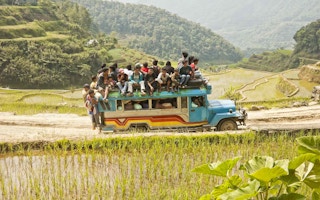Eight out of 10 Filipinos said that they would vote for a candidate during the General Election in May who has pledged to make food security and farmers’ needs top priorities for the government.
To continue reading, subscribe to Eco‑Business.
There's something for everyone. We offer a range of subscription plans.
- Access our stories and receive our Insights Weekly newsletter with the free EB Member plan.
- Unlock unlimited access to our content and archive with EB Circle.
- Publish your content with EB Premium.
This is one of the findings of the Third Quarter 2015 Social Weather Survey, a nationwide study conducted by local research firm Social Weather Station (SWS), which releases quarterly studies of social issues affecting Filipinos.
The survey, conducted between September 2 to 5 last year among 1,200 Filipinos, delved into the popularity of national election candidates. Among the questions were two on agriculture which were commissioned by environmental group Greenpeace Philippines. Respondents were asked about the causes that would make them pick a candidate and the agricultural issues that the new government should focus on.
The Philippines is among the countries most vulnerable to climate change, with its food and agriculture sector especially affected by extreme weather events such as strong typhoons and drought. 2015 was a particularly bad year, with key rice-producing regions such as Nueva Ecija and Pangasinan devastated by strong typhoons. Several other provinces which produce fruits and vegetables have also been hit by the ongoing dry spell brought on by the El Nino weather phenomenon.
According to the survey, 75 per cent of respondents would vote for a candidate who will “ensure food needs are met” while 70 per cent indicated they would pick a leader who will promote environmentally friendly farming.
The Philippines is holding a national election on May 11 to elect a new president and fill legislative positions as well as seats in local government units.
Forty-four per cent of respondents said it was important for the government to provide financial help to farmers who are adapting to climate change, while 39 per cent supported ecological agricultural practices such as organic farming.
Vigie Benosa-Llorin, a food and agriculture campaigner with Greenpeace, commented that presidential candidates, in particular, should take the survey results seriously because it shows how concerned Filipinos are about the country’s current food and agriculture systems.
“We challenge our presidential candidates to clearly state how he/she will support the farmers, address issues on food sufficiency, and make farming climate resilient and environment-friendly,” she added.
The Philippines has the Organic Agriculture Act which mandates the government to develop and promote ecological farming systems. However, the government must do more to implement the law, stressed Benosa-Llorin.
Greenpeace, which has been promoting ecological agriculture including organic farming, said a climate-resilient farming system could be the key to addressing food security in the country.
“It is a farming system that combines modern science and innovation with respect for nature and biodiversity, and ensures healthy farming and food production while protecting the soil, water and the climate. Ecological agriculture does not contaminate the environment with chemical inputs or use genetically engineered crops,” the group explained in the statement.
The organic approach to agriculture received a boost in the Philippines after the Supreme Court issued a landmark decision last month banning the field testing genetically-modified eggplant.
“The voters are looking and demanding for more than mere rhetoric, but rather real programmes and policies towards safe, healthy and sustainable food and agriculture systems,” said Benosa-Llorin.










